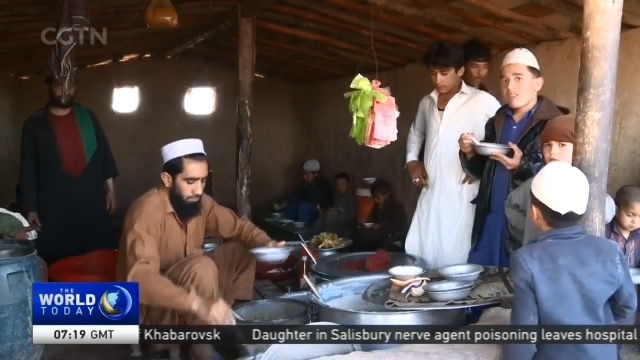
15:38, 11-Apr-2018
Afghan Refugees in Pakistan: Refugees forced to make tough decision

Figures from the United Nations show Pakistan is home to at least 1.38 million registered Afghan refugees. There are at least another million estimated to be outside the formal refugee registration system. The Pakistani government has initiated many plans to cope with this -- including extending the validity of registration cards while encouraging voluntary repatriation. Confronted with this dilemma, how do the refugees make their decision? Our correspondent Zhu Xuesong has more.
This is one of the hundreds of Afghan refugees' camps located in the suburbs of Islamabad, Pakistan's capital city. Like most of the other camps, it looks shabby and tatty, but it's been home to generations of Afghan refugees since the 1990s. 22-year-old Abdullah is one Afghan who was born and grew up here. Just a few weeks ago, he saw his first child born here too.
ABDULLAH AFGHAN REFUGEE IN PAKISTAN "I have worked in Balochistan. I have been to Karachi, Pakistan's largest city. I have been to other cities in Pakistan. Currently, I am working in Islamabad and its surrounding areas. And my whole life has been here."
The newborn baby brings joy to the family, but adds to their worries as well. At the end of last year, the Pakistani government announced the legal refugee status was due to expire for many Afghan residents. To give refugees abundant time to prepare for repatriation, the Pakistani government extended the validity of the PoR Cards for another 3 months. This extension may seem short, but it's the 7th extension by the Pakistani government.
ZHU XUESONG ISLAMABAD In my hand is a Proof of Registration Card -- a stay permit for Afghan refugees awarded by the Pakistani government. It provides identification for the cardholder. However, the length of stay has been omitted. That will depend on an announcement from the government. As long as Pakistan announces another extension, then there is the possibility that the Afghan refugees will be able to stay in their neighboring country.
Like Abdullah, most of the Afghan refugees believe the Pakistani government will continue to extend their stay permit. However, they have no idea of what is in store for them in the future. The uncertainty of life in a foreign land often rattles them. On the other hand, going back to Afghanistan doesn't seem easy. The security situation there has been deteriorating since the beginning of this year, as US-led coalition forces and government forces continue to battle the Afghan Taliban for control of areas of the country. This makes the idea of returning to Afghanistan seem impossible.
TASWUR AFGHAN REFUGEE IN PAKISTAN "I have been living in Pakistan for 35 years. I am 50 years old. Conflicts happen every day in my hometown in Afghanistan. Anyway, Afghanistan is my home-country. If I could go back and work in my home-country, why should I stay here?"

SITEMAP
Copyright © 2018 CGTN. Beijing ICP prepared NO.16065310-3
Copyright © 2018 CGTN. Beijing ICP prepared NO.16065310-3